Gerry Adams's Blog, page 34
December 6, 2018
The Alternative to Arms - The primacy of dialogue - an article in the New York Times
This is an article – published December 5th 2018 - from Turning Points, a magazine that explores what critical moments from this year might mean for the year ahead.
https://www.nytimes.com/2018/12/05/opinion/middle-east-peace-process.html
OpinionTURNING POINTSThe Alternative to ArmsBy Gerry Adams· Dec. 5, 2018When the Second World War ended in 1945 there were 51 member states in the United Nations. Today there are 193. Many of the new states emerged out of struggle and conflict as old empires crumbled.That cycle of political struggle continues today. The Brexit crisis may cause huge economic damage to Ireland’s economies and may even threaten the Good Friday Agreement. In Catalonia and the Basque Country, both of which seek independence from Spain, in Hong Kong and Palestine, people fight or have fought for the right to self-govern.The world is dominated by nations’ struggles to make their own laws and to decide their relationships with other nations. But for people to have control over the decisions that affect their lives, we must empower them through diplomacy, cooperation and dialogue. When governments put simple human decency and the rights of their people first as they negotiate the world’s conflicts, democracy will follow.That, however, is easier said than done, especially when the individual people responsible for upholding the law often value their own power over the common good.When I was a teenager in Belfast I realized that my peers and I were not being treated fairly. Northern Ireland was created when the British government partitioned Ireland. People were divided on sectarian lines and Catholics were deemed to be disloyal. We were denied basic rights in what was effectively an apartheid statelet.The inequality we experienced was deeply embedded in our society, to the point of being policy. Still, I thought that fixing it was only a matter of bringing it to the attention of the people in charge. Once they realized the problem they would rectify matters.I soon learned that the people in charge relied on that inequality for their power. They were unlikely to eradicate it if that would cost them their leverage, and any solution would be tempered to a degree that would keep them in charge. People who have power, or even the illusion of power, are loath to give it up.
Those on the other side of this equation — the disadvantaged — include many who believe they cannot change their situation. Some are reluctant even to consider that change is possible. Some are afraid of change. Some are used to society being organized in a certain way, even when that society discriminates against them. Some are too busy surviving or living their lives to consider that things could be different.There can be no progress without political struggle, but for it to succeed, people must be empowered. They need to have a stake in society and in their communities. They have to be cherished, and their humanity has to be respected and defended. They have rights and entitlements that must be upheld and promoted. Society needs to be citizen-centered, shaped around these rights.The reality, of course, is that progressive change in society rarely comes of its own accord. It has to be engineered, negotiated for. Violence often breeds when people believe that they have been left with no alternative. And this belief can become more entrenched as states use extrajudicial and violent means to defend their interests.Annual worldwide military spending is estimated to be over $1.7 trillion today, whereas the United Nations and its related agencies spend around $30 billion annually. Conflict is fueled by poverty, economic exploitation and the desire to control water rights, oil reserves and other natural resources.Britain had fought dozens of counterinsurgency wars before it sent its soldiers to Irish streets in 1969. It had a well-established policy that saw the law, according to Brigadier Frank Kitson, as “just another weapon in the government’s arsenal … little more than a propaganda cover for the disposal of unwanted members of the public.”Irish republicans and others succeeded in shifting from conflict to peace by building an alternative to armed struggle with the Good Friday Agreement. It provides for certain rights for Northern Ireland, including the right to a referendum on whether to remain a part of Britain or to end that relationship and establish a united Ireland. The agreement emerged slowly as a result of hard work, with parties and governments eventually being prepared to take risks, and with the support of the international community. It is still very much unfinished business.In the conflict between the Spanish state and the Basque independence campaigners a similar process, closely modeled on Ireland’s, has succeeded in ending armed conflict, even though the Spanish government has not fully engaged so far. Sinn Fein leaders have often traveled to other conflict zones, including Afghanistan and Colombia, advocating the primacy of dialogue, negotiations and peace processes.I have traveled to the Middle East on several occasions, speaking to Palestinians, visiting the Gaza Strip and the West Bank and speaking to senior leaders in Israel and Palestine. Regrettably, the failure of governments to uphold international law and U.N. resolutions, and the Israeli government’s refusal to defend democratic norms and find equitable and fair compromises, has left many Palestinians living in desperate conditions, with no hope of a different, better future. As a result, the Middle East exists in a permanent state of conflict.To change this demands a genuine effort to understand what motivates, inspires and drives people to make the choices they do. The dialogue that fosters that understanding is what ultimately empowers opposing sides of a conflict to come together.Whoever described politics as the art of the possible was reducing politics to a mediocre trade. People’s expectations of their worth must be raised — not lowered. When we do that, we enable democracy to take hold in even the most dire situations.
Published on December 06, 2018 05:26
November 30, 2018
'It’s a sign of a good horse that can fart in the morning.’
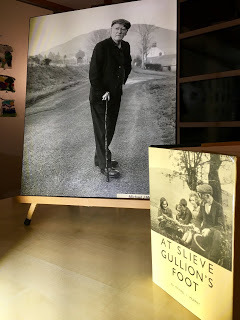 Michael J MurphyTwo weeks ago I was pleased to speak at the Michael J Murphy winter school in Tí Chulainn in the shadow of Sliabh Gullion. Who is Michael J Murphy I hear you ask. Michael was a Seanachai, a Sage and a Citizen. I first came across his writings when I was in Long Kesh. Some of his stories have stayed with me until now. He wrote six plays, ten books, was an accomplished poet, a photographer and a broadcaster. Michael was born in Liverpool in 1913. He came to Dromintee in 1922 with his parents and family. When he left school aged 14 he started to work as a farm labourer. He began to write down the stories he heard from the people he worked with. He also took thousands of photos which he developed himself. At a time, with some notable exceptions, few photographers recorded the lives of poor people or working people, particularly in rural communities, Michael’s photos are a treasure trove of people at work, at play or relaxing in their homes or in the field. In the ordinariness of their lives.He was a man with progressive social views and a belief in social justice. He also loved the landscape particularly around Sliabh Gullion along with Gullion itself. His writings about the countryside around here are particularly uplifting, lyrical and enchanting. Many of our songs, folk tales and poems, particularly in the Gaelic tradition have been kept alive because they are part of this living tradition. Michael devoted his life to the preservation of importantordinary every day matters. He presents us with an insight of the lived experiences of people, mostly struggling to eke a living from the soil, often in difficult times. He did not do this in a sentimental way. He lets the story tellers speak for themselves. From the early 1930s’ to his retirement in 1983 he gathered up and put together the largest collection of oral traditions in the English speaking world. It is available in 150 volumes in the National Folklore Collection in University College Dublin. He also compiled a glossary of Anglo-Irish speech.For this alone Michael J Murphy deserves our everlasting gratitude. He clearly loved words and the natural speech of the people. As he puts it himself; 'Some of the diction of the people around the mountain (Sliabh Gullion) may be classified as coarse and indelicate, but their syntax and vernacular, imaginative and pithy, is as Gaelic in structure today as their version of the English Elizabethan tongue which replaced the native language.’South Armagh, the Oriel and especially the area of Sliabh Gullion are the main sources of Michael’s work though he did spend some time in Glenhull in the Sperrin mountains of Tyrone and on Rathlin Island. He has published his stories from these places. Indeed, he travelled throughout Old Ulster. That is the nine counties plus Louth-from Rathlin to the Boyne. No border!
Michael J MurphyTwo weeks ago I was pleased to speak at the Michael J Murphy winter school in Tí Chulainn in the shadow of Sliabh Gullion. Who is Michael J Murphy I hear you ask. Michael was a Seanachai, a Sage and a Citizen. I first came across his writings when I was in Long Kesh. Some of his stories have stayed with me until now. He wrote six plays, ten books, was an accomplished poet, a photographer and a broadcaster. Michael was born in Liverpool in 1913. He came to Dromintee in 1922 with his parents and family. When he left school aged 14 he started to work as a farm labourer. He began to write down the stories he heard from the people he worked with. He also took thousands of photos which he developed himself. At a time, with some notable exceptions, few photographers recorded the lives of poor people or working people, particularly in rural communities, Michael’s photos are a treasure trove of people at work, at play or relaxing in their homes or in the field. In the ordinariness of their lives.He was a man with progressive social views and a belief in social justice. He also loved the landscape particularly around Sliabh Gullion along with Gullion itself. His writings about the countryside around here are particularly uplifting, lyrical and enchanting. Many of our songs, folk tales and poems, particularly in the Gaelic tradition have been kept alive because they are part of this living tradition. Michael devoted his life to the preservation of importantordinary every day matters. He presents us with an insight of the lived experiences of people, mostly struggling to eke a living from the soil, often in difficult times. He did not do this in a sentimental way. He lets the story tellers speak for themselves. From the early 1930s’ to his retirement in 1983 he gathered up and put together the largest collection of oral traditions in the English speaking world. It is available in 150 volumes in the National Folklore Collection in University College Dublin. He also compiled a glossary of Anglo-Irish speech.For this alone Michael J Murphy deserves our everlasting gratitude. He clearly loved words and the natural speech of the people. As he puts it himself; 'Some of the diction of the people around the mountain (Sliabh Gullion) may be classified as coarse and indelicate, but their syntax and vernacular, imaginative and pithy, is as Gaelic in structure today as their version of the English Elizabethan tongue which replaced the native language.’South Armagh, the Oriel and especially the area of Sliabh Gullion are the main sources of Michael’s work though he did spend some time in Glenhull in the Sperrin mountains of Tyrone and on Rathlin Island. He has published his stories from these places. Indeed, he travelled throughout Old Ulster. That is the nine counties plus Louth-from Rathlin to the Boyne. No border!
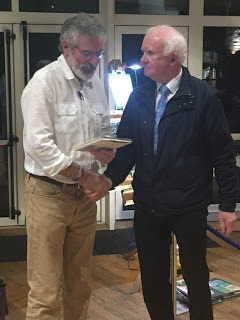 Michael chronicled and recorded or hand wrote stories from people about customs and traditions. About the Irish language. About smuggling, thatching, roofing, shearing, football. About road bowling, turf, birds, games and tricks, cures, remedies, sea weed, grinding barley, thinning turnips, potatoes – or priddies -and lots about planting, about holy wells, mass rocks, milling, banshees, and threshing. Stories about love and loss. About wakes and warriors. Invaders. About witches – an cailleach- about fairies – síogaí. And in his writings from Rathlin he adds stories about ship wrecks, fishing, seals, pirates, the learning of English, the decline of Irish. Michael’s book, Rathlin: Island of Blood and Enchantment, on the Irish language, is particularly poignant. It almost certainly reflects the decline of the language everywhere including in South Armagh. Michael collected these stories in the summers of ’53 and ’54 and credits all his sources by name. During his time on Rathlin some of the people he met also told him about the effects of the Great Hunger. These stories reflect the reality of that time on Rathlin and across Ireland. One local man, Mickey Joe, told him; “There were twelve hundred people on this island,now I think we have about one hundred and forty there are about forty-five families altogether. About three hundred people left in the one day, whole families went. Many of them died at sea on the way over… "
Michael chronicled and recorded or hand wrote stories from people about customs and traditions. About the Irish language. About smuggling, thatching, roofing, shearing, football. About road bowling, turf, birds, games and tricks, cures, remedies, sea weed, grinding barley, thinning turnips, potatoes – or priddies -and lots about planting, about holy wells, mass rocks, milling, banshees, and threshing. Stories about love and loss. About wakes and warriors. Invaders. About witches – an cailleach- about fairies – síogaí. And in his writings from Rathlin he adds stories about ship wrecks, fishing, seals, pirates, the learning of English, the decline of Irish. Michael’s book, Rathlin: Island of Blood and Enchantment, on the Irish language, is particularly poignant. It almost certainly reflects the decline of the language everywhere including in South Armagh. Michael collected these stories in the summers of ’53 and ’54 and credits all his sources by name. During his time on Rathlin some of the people he met also told him about the effects of the Great Hunger. These stories reflect the reality of that time on Rathlin and across Ireland. One local man, Mickey Joe, told him; “There were twelve hundred people on this island,now I think we have about one hundred and forty there are about forty-five families altogether. About three hundred people left in the one day, whole families went. Many of them died at sea on the way over… "
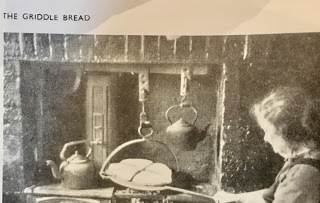 Michael's heart was never far from Sliabh Gullion. He wrote that this mystic mountain was a magnet for the likes of Maude Gonne McBride, Alice Milligan, W.B.Yeats, George Moore and AE (George Russell). Maud Gonne took part in an early Sinn Féin meeting on top of Sliabh Gullion. Standish O’Grady described Sliabh Gullion as the mountain of mystery. One of his books, Sayings and Stories from Sliabh Gullion is sourced entirely in Dromintee, Jonesborough, Killeavy, Mullaghbaun, Forkhill, Crossmaglen, Faughart and Omeath. Some of these sources were Irish speakers but even where they use the English the constructions are Irish language constructions. Some are quite funny. For example, two old men are in a graveyard at a funeral. One is complaining about all the things that are wrong with him, he is sore, he is tired, he has no energy.“It’s hardly worth your while going home” his companion said to him.“Old courting is cold courting’ is said about an old man courting a younger woman.” ‘‘A good arse can speak for itself.’‘It’s a sign of a good horse that can fart in the morning.’
Michael's heart was never far from Sliabh Gullion. He wrote that this mystic mountain was a magnet for the likes of Maude Gonne McBride, Alice Milligan, W.B.Yeats, George Moore and AE (George Russell). Maud Gonne took part in an early Sinn Féin meeting on top of Sliabh Gullion. Standish O’Grady described Sliabh Gullion as the mountain of mystery. One of his books, Sayings and Stories from Sliabh Gullion is sourced entirely in Dromintee, Jonesborough, Killeavy, Mullaghbaun, Forkhill, Crossmaglen, Faughart and Omeath. Some of these sources were Irish speakers but even where they use the English the constructions are Irish language constructions. Some are quite funny. For example, two old men are in a graveyard at a funeral. One is complaining about all the things that are wrong with him, he is sore, he is tired, he has no energy.“It’s hardly worth your while going home” his companion said to him.“Old courting is cold courting’ is said about an old man courting a younger woman.” ‘‘A good arse can speak for itself.’‘It’s a sign of a good horse that can fart in the morning.’
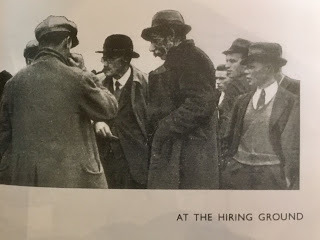 Michael was also a social campaigner. In particular,he raged against the Hiring Fairs. Both Michael J’s parents were hired in Newry when they were ten years old and the stories which he heard from them had a profound effect on him. His mother was paid thirty shillings for her first six months when she was ten years old and in later life she said that she had a weak chest from continual wettings while hired with inconsiderate farmers in County Down.It is little wonder that Michael campaigned throughout the 1930s against the ‘slave market’ which caused so much hardship for the children of the rural poor. He also had little regard for the pomposity and hypocrisy of some church clerics. He was accused once of transgressing Canon Law because one of the main characters in one of his plays was a girl born out of wedlock who he portrayed as being intelligent. He was threatened with excommunication but he replied that he couldn’t be excommunicated because as a socialist republican he was already excommunicated three times. So, if after reading this you are interested in Michael J Murphy why not go to your local library and ask for his books. They will open your eyes to an important part of our culture and history.Finally, An Cuimhneamh is an oral history project based in Tí Chulainn dedicated to perpetuating the memory of Michael J Murphy and his work. An Cuimhneamh deserves our support for its efforts to compile an extensive and ongoing archive of peoples' memories and experiences in south Armagh from e early twentieth century until today.
Michael was also a social campaigner. In particular,he raged against the Hiring Fairs. Both Michael J’s parents were hired in Newry when they were ten years old and the stories which he heard from them had a profound effect on him. His mother was paid thirty shillings for her first six months when she was ten years old and in later life she said that she had a weak chest from continual wettings while hired with inconsiderate farmers in County Down.It is little wonder that Michael campaigned throughout the 1930s against the ‘slave market’ which caused so much hardship for the children of the rural poor. He also had little regard for the pomposity and hypocrisy of some church clerics. He was accused once of transgressing Canon Law because one of the main characters in one of his plays was a girl born out of wedlock who he portrayed as being intelligent. He was threatened with excommunication but he replied that he couldn’t be excommunicated because as a socialist republican he was already excommunicated three times. So, if after reading this you are interested in Michael J Murphy why not go to your local library and ask for his books. They will open your eyes to an important part of our culture and history.Finally, An Cuimhneamh is an oral history project based in Tí Chulainn dedicated to perpetuating the memory of Michael J Murphy and his work. An Cuimhneamh deserves our support for its efforts to compile an extensive and ongoing archive of peoples' memories and experiences in south Armagh from e early twentieth century until today.
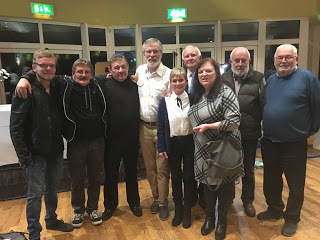 With family and of Michael J Murphy and organising committee
With family and of Michael J Murphy and organising committee
Published on November 30, 2018 03:30
November 23, 2018
DUPed again
When the news broke that a withdrawal Brexit agreement had been reached between the British government and the EU Sammy Wilson of the DUP responded in time worn fashion. It was, he said “a punishment beating for the UK because they dared to vote to leave the EU”.Even before he had read the agreement Wilson declared that the DUP would not support it. Later he told Channel 4 News, "If the EU think that what the IRA couldn't achieve, they're going to achieve, they have another thought coming to them."Outside the Westminster bubble loyalist activist Jamie Bryson was warning that the Brexit deal would "almost certainly trigger a grassroots unionist reaction that would dwarf the anger of the flag protests and Drumcree".This type of excessive threatening language has long been part of political unionism’s response when faced with the prospect of change. It’s a combination of hysterical exaggeration and threat. It’s the language of dire warnings, of civil war and armageddon, and of fear. It’s the language of 1998 when the DUP stood outside the negotiations as the Good Friday Agreement was achieved and then opposed it during the referendum campaign.
It is the language of 1985 when the DUP and UUP raged against Thatcher and the Anglo Irish Agreement or when hundreds gathered on a cold mountain waving their firearms certificates in defence of the union. It’s language which in the past excused and justified sectarian murder, and defended thousands of masked men in red berets marching through towns and villages.
It is the language of inequality and division which fed unionism’s anti-civil rights – anti-Catholic – attitude in the 1960s, and which 50 years earlier had created the apartheid orange state through partition.
DUP anger at Theresa May’s Brexit deal boiled over on Monday evening when its Westminster group voted in one instance with Labour against Theresa May and abstained in a number of other budget related votes in the British Parliament. The focus of the DUP now appears to be on joining with those remaining Brexiteer Ministers in the British Cabinet who believe that it is still possible to renegotiate the Brexit deal – something which has been ruled out by May and by the EU. They have only days to achieve their objective before an EU summit at the weekend signs off on the deal.
What happens if, as likely, they fail to change the withdrawal agreement? Will May survive? Have the dissidents in the Tory ranks the 48 signatories to demand a vote of no confidence in her leadership? Have the DUP overplayed their hand?
For most citizens living in the North the political machinations around the decisions which will shape our lives for decades to come has been reduced to a spectator sport. It’s a moment of high drama which has seen the North’s business community and farming sector publicly oppose the approach of both the DUP and UUP.
However, it is also a crisis with political implications that extend beyond the economic consequences of Brexit. It is always short sighted to judge any development solely by the discomfort it causes our opponents, notwithstanding the entertainment this provides. The reality is that the Good Friday Agreement now faces its greatest threat.
It is important to recall that in the section of the Good Friday Agreement, under Constitutional Issues, the role of the British government in the North is explicitly spelt out…”the power of the sovereign government with jurisdiction there shall be exercised with rigorous impartiality on behalf of all the people in the diversity of their identities and traditions and shall be founded on the principles of full respect for, and equality of, civil, political, social and cultural rights, of freedom from discrimination for all citizens, and of parity of esteem and of just and equal treatment for the identity, ethos, and aspirations of both communities.”
This fundamental role as joint co-guarantors of the Good Friday Agreement – of being impartial - has been significantly undermined. While many of us, including mé féin, remain justifiably sceptical about this, it is what the British government signed up for. The British refusal to defend the rights of Irish language speakers; to protect equality and human rights for gay and lesbian citizens; to implement agreements on legacy; or to honour outstanding Agreement commitments, for example on establishing a Bill of Rights, and create a Civic Forum, are all evidence of the absence of ‘rigorous impartiality’.
Moreover, following Brexit the British Conservatives remain wedded to ending the role of the European Court of Justice and getting rid of the Human Rights Act which protects the equality and human rights principles of the Agreement.
All of this heightens the need for the Irish government to defend the Good Friday Agreement and for the North to have a special relationship with the EU that reflects our unique situation. This is essential if the Good Friday Agreement is to be protected.
In this context the objective of Irish unity takes on a greater significance and imperative. This is a logical, common sense outcome to the political, social and economic fractures imposed by partition but it also makes sense in the current Brexit provoked crisis. Reunification will allow for the North to again become part of the EU. Hard border? Soft Brexit? Better to have no border at all.
Published on November 23, 2018 08:27
November 15, 2018
Our Precious Union.
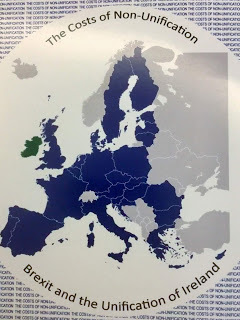
Brexit is a deadly serious issue. It threatens the two economies on this island, will undermine social cohesion, and directly attacks the Good Friday Agreement. It is within this context that the stupidity, insanity, absurdity and ludicrousness of Brexit and of the British government’s approach to Brexit emerges for all to see.Take one example. Last week the British Secretary of State for Exiting the EU Dominic Raab admitted that until recently he did not fully understand how much of British trade relies on the Dover to Calais crossing. This generated a flood of ironic and sarcastic responses asking whether Raab even knew that Britain was an island? Perhaps the most devastating and scathing critique came from Raab’s Parliamentary colleague, former British Tory Minister Ken Clarke, who responded on twitter with, “I’ve just given Dominic Raab an early Christmas present; a globe of the world. He was flabbergasted at how close the rest of Europe is then asked ‘what’s the blue stuff?’ I need a whiskey”Meanwhile the deadlines for agreement between Britain and the EU have been repeatedly broken amid ongoing confusion and uncertainty. An exchange of letters last week between the DUP leader Arlene Foster and the British Prime Minister Theresa May have given some insight into this and into the strained relationship between the two parties.In last week’s letter to the DUP May acknowledges that the “unique circumstances” of the North “could require specific alignment solutions in some scenarios” on regulations. Arlene Foster and her party interpreted this as a willingness by the British “to the idea of a border down the Irish Sea”. Foster added: “The Prime Minister’s letter raises alarm bells for those who value the integrity of our precious union and for those who want a proper Brexit for the whole of the UK.” The DUP accused May of breaking Tory commitments to the party.Our precious union? Whose precious union? A proper Brexit? The people of the North voted against Brexit. The DUP lost that one. So now they are gonna talk tough to the Brits for letting them down. Again.Should anyone be surprised by this turn of events? In June 2017 as the DUP and Conservatives were engaged in negotiations about a confidence and supply arrangement I warned that such dalliances always end in tears. It was a British Tory Prime Minister Ted Heath who scrapped the Unionist regime at Stormont in 1972. It was a British Tory Prime Minister Margaret Thatcher who signed the Anglo-Irish Agreement in 1985. It was a Tory Prime Minister John Major who agreed the Downing Street Declaration with the Irish government in 1993. And unionism should always remember the words of their great hero and leader Edward Carson who remarked in 1921; "What a fool I was. I was a puppet, so was Ulster, so was Ireland, in political game that was to get Tories into power".On Tuesday it was revealed that EU and the British government negotiators had reached an agreement on dealing with Britain’s border in Ireland. It would appear that the ‘backstop’, which is to prevent a hard border, will involve the North and Britain remaining in a ‘temporary customs arrangement.’ It isn’t clear what ‘temporary’ means nor what review mechanism has been agreed. But the text will apparently include specific provisions for the North should the ‘backstop’ fail to prevent a hard Brexit.Will the DUP support this plan? As I write no one knows. If I was a betting man I would say they will vote against it. But whatever awaits the DUP, or the British PM, we can be sure about one thing. Brexit will be disastrous for the North. Last week in a timely report two academics with the Canadian Company KLC Consultants, Kurt Hubner and Renger Herman Van Nieuwkoop, produced a report looking at the economic impact of Brexit and of Irish unity. It examined three possible scenarios: a hard Brexit in which the North and Britain leaves the EU single market and customs union; the North remaining in the single market and customs union and Irish unity.The report – ‘The Costs of Non-Unification: Brexit and the Unification of Ireland’ – warned that Brexit could cost the island of Ireland €42.5 billion over seven years. In a hard Brexit the North would lose €10.1 billion. Even with a so-called soft Brexit, in which the North remains within the single market and customs union, the financial cost to the six counties would be enormous at €3.8 billion.The 62-page report concluded that between now and 2025 Irish reunification could benefit the North by almost €18 billion and the South by €5-6 billion. It concludes that unification “is the only option with positive net effects.” It is the only long term, sustainable solution to the decades long crisis created by partition, and the current crisis created by the Brexit.The reality is that Arlene Foster’s ‘precious union’ is a narrow, intolerant place - a cold house for Irish language speakers, women, gay and lesbian citizens and for nationalists and republicans. We need a new union. Tone’s ‘cordial union’ which embraces self-determination and the ideal of a real Republic and which puts the people of the island of Ireland first. Our task as United Irelanders is to organise, mobilise, strategise and make it happen.
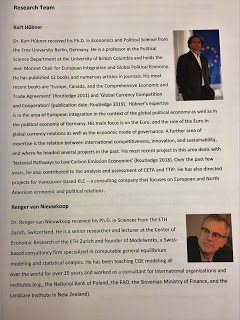
Published on November 15, 2018 03:35
November 10, 2018
BRINGING IT ALL BACK HOME.
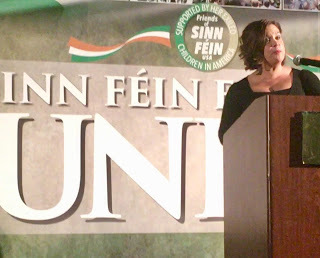 This article comes to you from the USA. It’s an interesting time to be here. The mid-term elections for the Congress; for some Senate seats; and for governorship and state legislatures and a host of other elected positions will be over by the time you get to read this. And you will know the results. But at the time of writing on the eve of the election everyone I have spoken to is focussed on what is going to happen. Will President Trump consolidate his position? Or will he lose out? Will the Democrats take the Congress?Sinn Féin steadfastly refuses to get involved in the domestic politics of the USA. Our cause here is the cause of Ireland. Of course we oppose many aspects of US foreign policy and I myself have raised these with previous administrations.As I travel from New York to Nashville to Atlanta and back to New York I am also conscious of the homeless people I see in all these cities and the other signs of poverty sitting starkly alongside affluence. This is a time of political discord here. Perhaps it was always thus but there is an edge to it that wasn’t so obvious during other times that RG and I spent here.
This article comes to you from the USA. It’s an interesting time to be here. The mid-term elections for the Congress; for some Senate seats; and for governorship and state legislatures and a host of other elected positions will be over by the time you get to read this. And you will know the results. But at the time of writing on the eve of the election everyone I have spoken to is focussed on what is going to happen. Will President Trump consolidate his position? Or will he lose out? Will the Democrats take the Congress?Sinn Féin steadfastly refuses to get involved in the domestic politics of the USA. Our cause here is the cause of Ireland. Of course we oppose many aspects of US foreign policy and I myself have raised these with previous administrations.As I travel from New York to Nashville to Atlanta and back to New York I am also conscious of the homeless people I see in all these cities and the other signs of poverty sitting starkly alongside affluence. This is a time of political discord here. Perhaps it was always thus but there is an edge to it that wasn’t so obvious during other times that RG and I spent here.
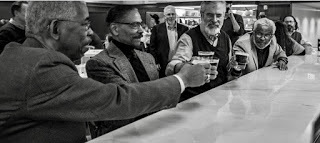 The visits to Nashville and Atlanta were a reconnection with the Irish diaspora there. I got a sliotar from Nashville’s local GAA club. But the highlight of that visit was the meeting with veterans of the civil rights struggle last Saturday morning. We visited the Civil Rights Room in the Nashville Public Library. There I was honoured to meet with two former civil rights leaders Rip Patton and King Hollands. They and around 50 local people had come along to hear me talk about the connections between the Civil Rights Movement in the USA and the Civil Rights Association in the North in the 1960s.The two civil rights leaders had participated in the famous Woolworths Lunchtime sit ins in 1960 and were among the freedom riders, many of whom were arrested and imprisoned. At that time black citizens were not allowed under the draconian segregation laws to sit at whites only lunch counters. There was also violent opposition to the integration of the interstate transport system. So some courageous women and men, black and white – freedom riders – took to the buses and trains to challenge segregation. Many were beaten and hundreds were imprisoned.
The visits to Nashville and Atlanta were a reconnection with the Irish diaspora there. I got a sliotar from Nashville’s local GAA club. But the highlight of that visit was the meeting with veterans of the civil rights struggle last Saturday morning. We visited the Civil Rights Room in the Nashville Public Library. There I was honoured to meet with two former civil rights leaders Rip Patton and King Hollands. They and around 50 local people had come along to hear me talk about the connections between the Civil Rights Movement in the USA and the Civil Rights Association in the North in the 1960s.The two civil rights leaders had participated in the famous Woolworths Lunchtime sit ins in 1960 and were among the freedom riders, many of whom were arrested and imprisoned. At that time black citizens were not allowed under the draconian segregation laws to sit at whites only lunch counters. There was also violent opposition to the integration of the interstate transport system. So some courageous women and men, black and white – freedom riders – took to the buses and trains to challenge segregation. Many were beaten and hundreds were imprisoned.
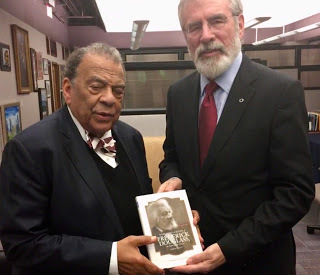 The Civil Rights Room is a time capsule of all of this, including imagery, photographs, and books of that dangerous time. Later I visited the Woolworths building and met up again with Rip and King, and with Judge Richard Dinkins, another veteran of those days. We briefly sat at the lunch counter where almost 60 years ago African American citizens were attacked. Later at a lunch they recounted their experiences of those days, including arrests and assaults, before we sang ‘We shall overcome’ to our surprised guests.In Atlanta Richard and I visited the ‘Centre for Civil and Human Rights’. The filmed reports of those hard days can be watched on screens, including Martin Luther King’s ‘I have a dream’ speech along with the speeches of others. You can relive the sit-in protests at a lunch counter, by closing your eyes, and putting on ear phones to hear shouts of abuse which grows steadily until the voices are shouting and your seat shakes. It’s a very visceral experience.On Tuesday evening I will address the Friendly Sons and Daughters of St. Patrick’s dinner before heading back to New York for the annual Friends of Sinn Féin New York dinner. This will be our 23rd annual dinner. The first was held on May 10th 1995 in the Essex House Hotel in New York. This year Mary Lou McDonald will be making her inaugural speech as Uachtarán Shinn Féin. I will be introducing her. She will then go on to do the same in Toronto in Canada.Our party has been well served by the people who organise this key fundraising event, especially the Dinner Committee. We have also been well served by those who have worked with us in north America since Friends of Sinn Féin was established. Ciaran Staunton was our first representative. Followed by Mairead Keane. They did exemplary work. And the indominatable Rita O Hare has represented us diligently and tirelessly since then.
The Civil Rights Room is a time capsule of all of this, including imagery, photographs, and books of that dangerous time. Later I visited the Woolworths building and met up again with Rip and King, and with Judge Richard Dinkins, another veteran of those days. We briefly sat at the lunch counter where almost 60 years ago African American citizens were attacked. Later at a lunch they recounted their experiences of those days, including arrests and assaults, before we sang ‘We shall overcome’ to our surprised guests.In Atlanta Richard and I visited the ‘Centre for Civil and Human Rights’. The filmed reports of those hard days can be watched on screens, including Martin Luther King’s ‘I have a dream’ speech along with the speeches of others. You can relive the sit-in protests at a lunch counter, by closing your eyes, and putting on ear phones to hear shouts of abuse which grows steadily until the voices are shouting and your seat shakes. It’s a very visceral experience.On Tuesday evening I will address the Friendly Sons and Daughters of St. Patrick’s dinner before heading back to New York for the annual Friends of Sinn Féin New York dinner. This will be our 23rd annual dinner. The first was held on May 10th 1995 in the Essex House Hotel in New York. This year Mary Lou McDonald will be making her inaugural speech as Uachtarán Shinn Féin. I will be introducing her. She will then go on to do the same in Toronto in Canada.Our party has been well served by the people who organise this key fundraising event, especially the Dinner Committee. We have also been well served by those who have worked with us in north America since Friends of Sinn Féin was established. Ciaran Staunton was our first representative. Followed by Mairead Keane. They did exemplary work. And the indominatable Rita O Hare has represented us diligently and tirelessly since then.
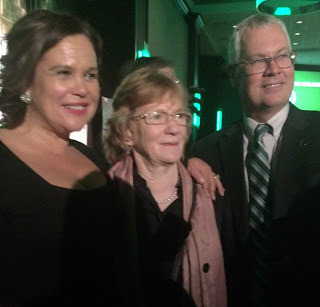 Friends of Sinn Fein has been led by Larry Downes, the founding President and mainstay of the organisation for a very long time. He was followed by the late Jim Cullen and we are now fortunate to have Mark Guilfoyle in that post. They have been ably supported by countless others in cities and states across the USA and Canada – too many to mention – who I have had the great pleasure and honour to work with. I have been uplifted, moved, inspired and encouraged by all of them. And I am confident that they will continue to work closely with Mary Lou as we enter a new phase of struggle, under a new leadership determined to secure Irish unity.
Friends of Sinn Fein has been led by Larry Downes, the founding President and mainstay of the organisation for a very long time. He was followed by the late Jim Cullen and we are now fortunate to have Mark Guilfoyle in that post. They have been ably supported by countless others in cities and states across the USA and Canada – too many to mention – who I have had the great pleasure and honour to work with. I have been uplifted, moved, inspired and encouraged by all of them. And I am confident that they will continue to work closely with Mary Lou as we enter a new phase of struggle, under a new leadership determined to secure Irish unity.
Published on November 10, 2018 03:39
November 1, 2018
The Best Kept Secret of the Irish Peace Process
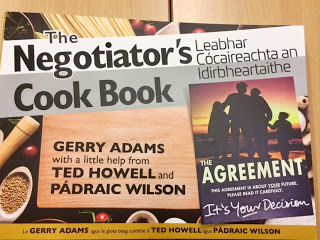
Countless books have been written about the Irish peace process. Its origins - the principle characters and key dates. Who met who, and when, and where, and what was said? And yet there are still aspects of that process which have not been aired in public. Private meetings that took place. Conversations that were held in quiet, out of the way places involving men and women who are not household names. There is another book – a negotiators book – still to be written. One of these days.The Negotiators Cookbook is not that book. It lifts the lid on one aspect of the negotiations known to only a few. When you bring a large team of hungry republicans together for days – sometimes weeks on end – how do you feed them? This is not a frivolous matter. There is a psychology to the planning and running of negotiations.Castle Buildings where the Good Friday Agreement negotiations occurred had a good canteen. Siobhan O’Hanlon and Sue Ramsay developed a great relationship with the catering staff that ensured the Sinn Féin team had tea, coffee, sandwiches, and hot food readily available. Then, and in the years since the Good Friday Agreement was agreed, negotiations would sometimes move to other venues. Downing Street, Leeds Castle, Weston Park, Lancaster House, St. Andrews, Hillsborough Castle, Castle Buildings and Dublin Castle. The hours could be long. Round the clock.Talks in Downing Street were a particularly hungry event. It may not look it but the building on the inside is very large. And there are lots of people working between the interconnecting buildings that run the length of the street. But the British idea of welcoming the negotiating teams didn’t extend to providing food. It didn’t matter if you were there from early morning to late at night, or whether you were a unionist or republican, all that was provided was an occasional cup of tea or coffee and maybe a biscuit.The late Brian Faulkner, the last Prime Minister from the old unionist regime, once complained that there was no food provided during crisis meetings in Downing Street on 19th August 1969.Food is a simple way to break down barriers and create a relaxed atmosphere. Martin McGuinness and I met Tony Blair regularly for ten years or so. Some of our better conversations were held in Chequers over dinner. But in the main food was generally in short supply when the British side were organising meetings.Others are less tight fisted when it comes to food. I have especially fond memories of a visit to Cuba in December 2001. I was part of a Sinn Féin delegation visiting Havana to meet with Cuban President Fidel Castro. The meeting with Fidel want on for three hours and after a short break it resumed over a dinner that began around 10pm and finished about 3am. Good food, good company, great craic.When the negotiations went into the wee hours at Hillsborough Castle and elsewhere we would send someone off to the local chip shop. Eventually, however, Ted Howell stepped into the breach. As well as being an indispensible member of our negotiating team from the days when I was first meeting John Hume and the SDLP in the 1980s, Ted is also a first class cook. A culinary master. His occasional soirees are happy events for their great atmosphere but especially for the quality, quantity and diversity of dishes.Ted started to make soups and bake bread and bring it up to the negotiations. It evolved over time into him arriving with bags laden with tubs of pasta, spaghetti bolognese, lasagne, salads, pies, hams, fish dishes, curries, soups and beans. Ted loves to cook with beans and his home-made breads, still warm, are delicious.Padraic Wilson is another master baker. His specialities are fine deserts and pastries of all kinds, including exotic moist fruit cakes. Delicious and delightful.This cookbook is dedicated to the ate Siobhan O’Hanlon and the Sinn Féin negotiations team, especially Ted and Padraic. It is a tribute to them. While the rest of us would go home and head to our beds for some sleep Ted and Padraic would be in their kitchens preparing for the next day. So, thanks to both. And thanks also to all of those who helped in the compiling and publication of the Negotiators Cookbook.Finally, with this cookbook you have the opportunity to try out the recipes and the dishes that fed the Sinn Fein negotiating team. They would grace any dinner table. They are also healthy and nourishing. So, enjoy and bon appetite.If you’re interested in purchasing a copy for yourself or a copy for someone’s Christmas stockings its available at www.sinnfeinbookshop.comor sales@sinnfeinbookshop.com or phone 00 353 18726100
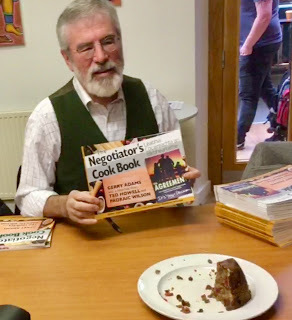
Published on November 01, 2018 02:09
October 25, 2018
This must be last time citizens in North are denied Vote in Presidential election
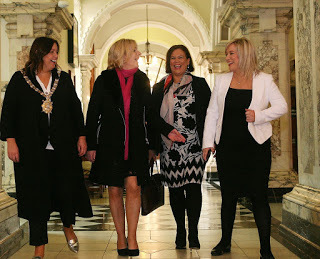 Deirdre Hargey, Liadh Ní Riada, Mary Lou McDonald and Michelle O'Neill
Deirdre Hargey, Liadh Ní Riada, Mary Lou McDonald and Michelle O'NeillSaturday is count day to elect the next President of Ireland. Irish citizens living in the North do not have a vote in this election. But that shouldn’t stop you from having your say. Almost all of us have relatives, friends, associates who will have a vote. So it’s not too late. With less than 48 hours to go before polls close give them a ring. Send them a text. Email. Facebook. Instagram. Urge them to vote for the only Presidential candidate who has put the North and the issue of Irish Unity front and centre in her campaign – Liadh Ní Riada. Liadh is the Sinn Féin candidate. A gaelgeoir. A musician. An activist. A republican. A woman. A member of the European Parliament representing the Munster constituency. The daughter of Sean O’Riada who was the single most important figure in the revival of Irish traditional music in the 1960s and who wrote the acclaimed Mise Éire.
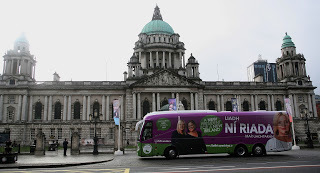 For weeks now Liadh, along with her team of party activists, have been a familiar sight on the roads and motorways as they crisscross the island of Ireland. This week she was in Belfast.Whatever the outcome of this Presidential election we all need to ensure that this is the last time that Irish citizens in the north are denied the vote to elect the President of Ireland. Next May there will be an opportunity to change this. On May 24th, the same date as the EU and local government elections in the south, a referendum will be held on extending the vote in presidential elections. Sinn Féin has consistently argued for Irish citizens in the north and those who in live in the diaspora to have a say in the life of the nation, including the right of northern representatives to speak in the Oireachtas. When we raised it during the Good Friday Agreement negotiations the then Taoiseach, Bertie Ahern, committed to facilitate this. However, in 2006 the Fianna Fáil government reneged on this commitment.In 2011 the newly Fine Gael/Labour government agreed to establish a Constitutional Convention to recommend constitutional reform. Sinn Féin made a detailed submission including the proposition that Irish citizens in the north and the Irish diaspora should have the right to vote in Presidential elections.Two years later in September 2013 the Constitutional Convention heard evidence on this from academic and legal experts. The views of representatives of Irish communities living in the USA, Britain, Canada, Australia and elsewhere around the world, were also heard via a live video link-up.I was there along with Martin McGuinness and Mary Lou McDonald. It was a good debate. Many speakers took the view that the opportunity for unionists to vote for an Irish President – if they choose to – was a positive way of engaging with unionists. It is also a natural extension of the Good Friday Agreement. 78% said yes to citizens’ resident outside the State having the right to vote in a Presidential election. When specifically asked about citizens resident in the north 73% said yes.It has taken five years of constant lobbying to get to get a date for this referendum. In May the Taoiseach said that: “Following through on a Citizens’ Assembly proposal, we will have a referendum next year on extending the right to vote in presidential elections to all Irish citizens, including those living in the North and across the world …”The date set is May 24th next year.That gives all of us who support this concept the time to plan, strategise and prepare a campaign to win that referendum. Inevitably parties, including Sinn Féin, will be very busy fighting the local and European elections, and possibly a general election. Despite this there must be a significant and priority focus on the referendum vote. It will also require a dialogue with unionism. A widening of the franchise for Presidential elections will offer those who are unionist the opportunity to engage in a positive and inclusive way and to participate in the life of the Irish nation. It will enhance the role of the President as the representative of all the citizens of Ireland and will be seen as a modernising measure in the context of Irish citizenship and of the institution. So, once the count concludes on Saturday this is our next big project.
For weeks now Liadh, along with her team of party activists, have been a familiar sight on the roads and motorways as they crisscross the island of Ireland. This week she was in Belfast.Whatever the outcome of this Presidential election we all need to ensure that this is the last time that Irish citizens in the north are denied the vote to elect the President of Ireland. Next May there will be an opportunity to change this. On May 24th, the same date as the EU and local government elections in the south, a referendum will be held on extending the vote in presidential elections. Sinn Féin has consistently argued for Irish citizens in the north and those who in live in the diaspora to have a say in the life of the nation, including the right of northern representatives to speak in the Oireachtas. When we raised it during the Good Friday Agreement negotiations the then Taoiseach, Bertie Ahern, committed to facilitate this. However, in 2006 the Fianna Fáil government reneged on this commitment.In 2011 the newly Fine Gael/Labour government agreed to establish a Constitutional Convention to recommend constitutional reform. Sinn Féin made a detailed submission including the proposition that Irish citizens in the north and the Irish diaspora should have the right to vote in Presidential elections.Two years later in September 2013 the Constitutional Convention heard evidence on this from academic and legal experts. The views of representatives of Irish communities living in the USA, Britain, Canada, Australia and elsewhere around the world, were also heard via a live video link-up.I was there along with Martin McGuinness and Mary Lou McDonald. It was a good debate. Many speakers took the view that the opportunity for unionists to vote for an Irish President – if they choose to – was a positive way of engaging with unionists. It is also a natural extension of the Good Friday Agreement. 78% said yes to citizens’ resident outside the State having the right to vote in a Presidential election. When specifically asked about citizens resident in the north 73% said yes.It has taken five years of constant lobbying to get to get a date for this referendum. In May the Taoiseach said that: “Following through on a Citizens’ Assembly proposal, we will have a referendum next year on extending the right to vote in presidential elections to all Irish citizens, including those living in the North and across the world …”The date set is May 24th next year.That gives all of us who support this concept the time to plan, strategise and prepare a campaign to win that referendum. Inevitably parties, including Sinn Féin, will be very busy fighting the local and European elections, and possibly a general election. Despite this there must be a significant and priority focus on the referendum vote. It will also require a dialogue with unionism. A widening of the franchise for Presidential elections will offer those who are unionist the opportunity to engage in a positive and inclusive way and to participate in the life of the Irish nation. It will enhance the role of the President as the representative of all the citizens of Ireland and will be seen as a modernising measure in the context of Irish citizenship and of the institution. So, once the count concludes on Saturday this is our next big project.
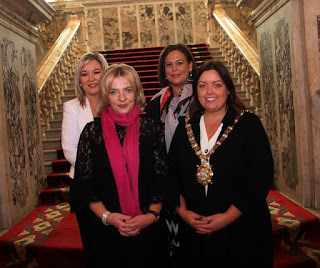
Published on October 25, 2018 02:28
October 19, 2018
We need a new Union
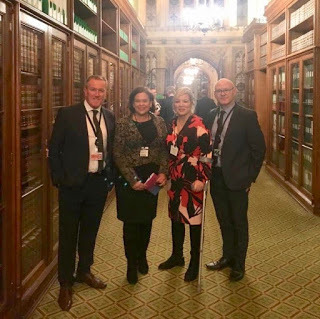 Conor Murphy, Mary Lou McDonald, Michelle O'Neill and Paul Maskey in London for meeting with British Prime Minister Theresa May. They told her there has to be a unity referendum
We need a new unionCaptain Jack Doyle in Sean O’Casey’s “Juno and the Paycock” has a word for it – ‘chassis.’ He says: “I’m telling you … Joxer …th’ whole worl’s … in a terr … ible state o’ … chassis.” Last week, Denis Naughten the Minister for Communications in the Irish government resigned in bad temper. His decision was as a result of accusations of inappropriate meetings he had held with a businessman who now leads the only bid still in place for a billion-euro state contract to supply broadband to half a million rural homes. It was a grievous blow to the Fine Gael minority government which depends on a confidence and supply agreement with Fianna Fáil. With Fianna Fáil committed to abstain in key votes An Taoiseach Leo Varadkar needs 57 votes in the Dáil to sustain his government and pass legislation. Naughten’s resignation and the recent departure of another Fine Gael TD Peter Fitzpatrick, meant that the government had only 55 reliable votes. It has again achieved the 57 figure following commitments from Independent TDs Noel Grealish and Michael Lowry. Lowry, is a previous Fine Gael Minister for Communications who was heavily criticised in the report of the Moriarty Tribunal which was published in 2011. Moriarty was set up to investigate payments to politicians and the sale of the state’s second mobile phone licence to Esat, a consortium led by Denis O’Brien.In the final report of the Moriarty Tribunal Lowry was accused of having “provided substantive information to Denis O’Brien, of significant value and assistance to him in securing the licence”, that he “conferred a benefit on Mr. Denis O’Brien, a person who made payments to Mr. Lowry”which according to the Tribunal “not only influenced but delivered the result” when ESAT won the mobile phone licence.How would O’Casey describe the irony of a Fine Gael minority government losing one Minister for Communications over questions about his handling of a billion-euro contract now being dependent for its survival on the vote of a previous Fine Gael Minister for Communications who was accused by Moriarty of “cynical and venal abuse of office” and of attempting to influence a contract in a way that was “profoundly corrupt to a degree that was nothing short of breathtaking”?The question most commentators are now asking is when will the general election take place? The speculation among the political commentators is of a spring election. Who knows? Who can tell?But chassis is not limited to the south. There is no power sharing government in the north. The DUP failed that test. They will fail the Brexit test also. Perhaps more than any other word chassis describes the chaos that is Brexit. In the middle of this mess is Arlene Foster. Foster’s stated view that a no-deal outcome is better than a deal which sees the north stay within the EU Customs Union, and her vehement opposition to any backstop agreement which protects the north’s agricultural sector and economy, have left the people of the island of Ireland facing the real possibility of a hard economic border.It is little wonder that Brexit and the current political crises have together generated increasing interest in and support for a united Ireland. While it is always necessary to apply a health warning when looking at opinion polls nonetheless the consistent pattern of recent polls is indicative of a trend. At the weekend the Paddy Power/Red C poll concluded that a majority of people in the south – 61% - would like to see a United Ireland emerging out of Brexit. This percentage has remained largely consistent over recent polls. Another poll published during the Tory Party conference by the Centre on Constitutional Change, which is based in Edinburgh University, caught the media attention in the north because it claimed that “87% of (overwhelmingly unionists) leave voters in Northern Ireland see the collapse of the peace process as an acceptable price for Brexit.”What went largely unreported was the fact that in this poll 77% of Conservative voters thought Brexit would be worthwhile even if it led to Scottish Independence and to the collapse of the peace process. Professor Richard Wyn Jones from Cardiff University said that; “The bonds that have tied the union together have frayed to such an extent that, frankly it’s hard to imagine that the proposed festival of ‘national renewal’ is going to do anything more than emphasise the extent to which we continue to drift apart.”English nationalism is asserting itself. The North and Scotland are of lesser concern than securing the end of the union with Europe. The jingoism of Rees Mogg, of Boris Johnson, David Davis and others who obsess over the glory days of Empire, when the sun never set on Britain’s occupied colonial territories, is straining the boundaries of Britain’s disunited Kingdom. All of this underpins the accuracy of the Irish republican analysis over two centuries of struggle. We need a new union. As Tone described it “a cordial union among all the people of Ireland, to maintain that balance which is essential to the preservation of our liberties and the extension of our commerce.” Whatever happens with Brexit that has to remain our focus and endeavour in the time ahead otherwise chassis will continue to be a way of life.
Conor Murphy, Mary Lou McDonald, Michelle O'Neill and Paul Maskey in London for meeting with British Prime Minister Theresa May. They told her there has to be a unity referendum
We need a new unionCaptain Jack Doyle in Sean O’Casey’s “Juno and the Paycock” has a word for it – ‘chassis.’ He says: “I’m telling you … Joxer …th’ whole worl’s … in a terr … ible state o’ … chassis.” Last week, Denis Naughten the Minister for Communications in the Irish government resigned in bad temper. His decision was as a result of accusations of inappropriate meetings he had held with a businessman who now leads the only bid still in place for a billion-euro state contract to supply broadband to half a million rural homes. It was a grievous blow to the Fine Gael minority government which depends on a confidence and supply agreement with Fianna Fáil. With Fianna Fáil committed to abstain in key votes An Taoiseach Leo Varadkar needs 57 votes in the Dáil to sustain his government and pass legislation. Naughten’s resignation and the recent departure of another Fine Gael TD Peter Fitzpatrick, meant that the government had only 55 reliable votes. It has again achieved the 57 figure following commitments from Independent TDs Noel Grealish and Michael Lowry. Lowry, is a previous Fine Gael Minister for Communications who was heavily criticised in the report of the Moriarty Tribunal which was published in 2011. Moriarty was set up to investigate payments to politicians and the sale of the state’s second mobile phone licence to Esat, a consortium led by Denis O’Brien.In the final report of the Moriarty Tribunal Lowry was accused of having “provided substantive information to Denis O’Brien, of significant value and assistance to him in securing the licence”, that he “conferred a benefit on Mr. Denis O’Brien, a person who made payments to Mr. Lowry”which according to the Tribunal “not only influenced but delivered the result” when ESAT won the mobile phone licence.How would O’Casey describe the irony of a Fine Gael minority government losing one Minister for Communications over questions about his handling of a billion-euro contract now being dependent for its survival on the vote of a previous Fine Gael Minister for Communications who was accused by Moriarty of “cynical and venal abuse of office” and of attempting to influence a contract in a way that was “profoundly corrupt to a degree that was nothing short of breathtaking”?The question most commentators are now asking is when will the general election take place? The speculation among the political commentators is of a spring election. Who knows? Who can tell?But chassis is not limited to the south. There is no power sharing government in the north. The DUP failed that test. They will fail the Brexit test also. Perhaps more than any other word chassis describes the chaos that is Brexit. In the middle of this mess is Arlene Foster. Foster’s stated view that a no-deal outcome is better than a deal which sees the north stay within the EU Customs Union, and her vehement opposition to any backstop agreement which protects the north’s agricultural sector and economy, have left the people of the island of Ireland facing the real possibility of a hard economic border.It is little wonder that Brexit and the current political crises have together generated increasing interest in and support for a united Ireland. While it is always necessary to apply a health warning when looking at opinion polls nonetheless the consistent pattern of recent polls is indicative of a trend. At the weekend the Paddy Power/Red C poll concluded that a majority of people in the south – 61% - would like to see a United Ireland emerging out of Brexit. This percentage has remained largely consistent over recent polls. Another poll published during the Tory Party conference by the Centre on Constitutional Change, which is based in Edinburgh University, caught the media attention in the north because it claimed that “87% of (overwhelmingly unionists) leave voters in Northern Ireland see the collapse of the peace process as an acceptable price for Brexit.”What went largely unreported was the fact that in this poll 77% of Conservative voters thought Brexit would be worthwhile even if it led to Scottish Independence and to the collapse of the peace process. Professor Richard Wyn Jones from Cardiff University said that; “The bonds that have tied the union together have frayed to such an extent that, frankly it’s hard to imagine that the proposed festival of ‘national renewal’ is going to do anything more than emphasise the extent to which we continue to drift apart.”English nationalism is asserting itself. The North and Scotland are of lesser concern than securing the end of the union with Europe. The jingoism of Rees Mogg, of Boris Johnson, David Davis and others who obsess over the glory days of Empire, when the sun never set on Britain’s occupied colonial territories, is straining the boundaries of Britain’s disunited Kingdom. All of this underpins the accuracy of the Irish republican analysis over two centuries of struggle. We need a new union. As Tone described it “a cordial union among all the people of Ireland, to maintain that balance which is essential to the preservation of our liberties and the extension of our commerce.” Whatever happens with Brexit that has to remain our focus and endeavour in the time ahead otherwise chassis will continue to be a way of life.
Published on October 19, 2018 01:38
October 17, 2018
Traveller Ethnicity and their contribution to Irish Society
March 1st last year witnessed the formal recognition by the government and the Dáil of the ethnicity of Travellers. It came after a long and difficult campaign and those of us who were part of that knew that recognition was only one step - albeit an important step - in challenging discrimination and achieving equality for Travellers. For those who don't accept Traveller ethnicity I publish again my remarks in the Dáil on that important occasion.Traveller Ethnicity Tá mé fíor-bhuíoch as an deis labhairt ar an ábhar tábhachtach anocht. Is lá agus oíche fíor-thábhachtach don Lucht Taistil é. Cuirim fáilte roimh na grúpaí anseo, na daoine sa Gallery and elsewhere in Leinster House and I extend solidarity to all Travellers on this historic day. It is their day, and a momentous step forward for equality.
Christy Moore has consistently paid a tribute to John Reilly, who kept alive songs like "Well Below the Valley", which have been sung for 200 years. That is the Traveller community I know - creative, strong, resilient and generous.
In the summer of 1969, when sectarian evictions were incited in the North in reaction to the demands of the civil rights movement, I was one of a small group of activists who helped families to move their belongings from their homes. It should be noted that it was people from the Traveller community in Belfast who provided and drove the lorries, at great risk to themselves, which took these families out of danger.
Among Travellers today there is an articulate grassroots leadership well able to voice Traveller issues and who have consistently raised their community's awareness of their rights. Some of them are in the Visitor’s Gallery. I know they are up for the challenge of ensuring that all of us together resolve lingering issues and ensure our society embraces the differences that make up the diversity and uniqueness of our the people of our island.
Through strong and resolute leadership like that which was shown tonight and co-operation at all levels in political and civic society, and in our settled and Traveller communities, we can ensure a society that underpins equality for every citizen.
This debate is a major step in the right direction. We need to keep moving in that direction. It is a very historic moment for the 40,000 members of the Traveller community. It is an important symbolic acknowledgement but it must also pave the way for real, practical change. Action must follow ethnicity.
Published on October 17, 2018 11:54
October 13, 2018
Thank you John Hume
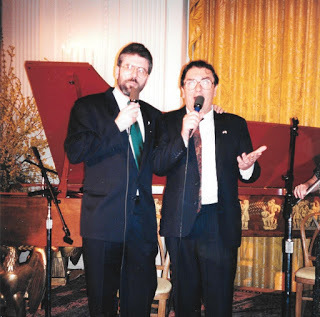
Mise agus John serenading Irish America at the White House St. Patrick's Day event in March 1995
The Thursday evening before last I was part of a panel in the Helix Theatre at Dublin City University (DCU) to discuss the contribution of John Hume to the work of civil rights and peace. There were around 200 people present. We watched Maurice Fitzpatrick's film ‘John Hume in America’. Afterward Brid Rodgers, a former Deputy Leader of the SDLP; Liz O Donnell, a former Minister of State at the Dept. of Foreign Affairs; Maurice Fitzpatrick; and I, joinedJohn Doyle, the Executive Dean of DCU's Faculty of Humanities and Social Science, to discuss the film.Fitzpatrick’s film recalls John Hume’s connections on Capitol Hill and his efforts to encourage US governments to engage positively in efforts to support civil rights in the North. Through archive footage and interviews with Presidents Clinton, Carter, Bruce Morrison, Richie Neal and others it records John’s frequent visits to Washington and the impact on US policy of his engagements with Teddy Kennedy, Tip O’Neill and others.The film also covers the private conversations John and I held over many years, and our efforts, through ‘Hume-Adams’ , to put in place a process of inclusive dialogue that would create a peace process and end the conflict. While it records the hysterical political reaction in the South to our conversations, and especially within elements of the southern media establishment, in my opinion it skips over this full frontal, sustained personal and venomous attack on John. They were difficult years. Elements within the SDLP leadership were opposed to what John was trying to do. The Irish and British governments preferred to stick with the old strategy of refusing to talk to Sinn Féin. But John and I stuck with it, and with the help of the Fr. Alec Reid, Fr. Des and others, cessations were realised, negotiations succeeded, and in 1998 the Good Friday Agreement was achieved and endorsed in referendum North and South.In one of my contributions at the Helix I outlined the efforts – stretching over years to get talks – dialogue – started and how after setbacks, prevarications and refusals, Fr Alec got a prompt and positive response from John to a request to speak to me.I put the question to the panel and the audience – ‘what if John had said No? What if he had taken the line of the other parties and governments and the Church leaderships?’
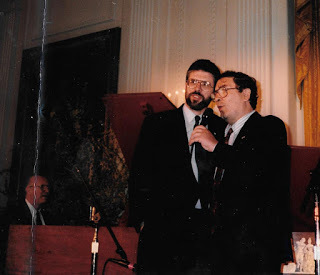
Still singingThat remains a pertinent question. Success has many parents. Many good people played positive roles in developing the peace process but to John’s great credit he did the right thing and stuck with it. He engaged in dialogue. He was ably assisted and supported by his wife Pat. John and I met often in his home in Derry or Donegal. Pat was always welcoming and helpful and positive. I believe she was probably his closest and best adviser. Of course, John and I disagreed on many issues but we focussed on the need to develop an alternative way to achieve political objectives that would make armed struggle redundant.That was our achievement. With the input of then Taoiseach Albert Reynolds, friends in Irish America and others, this became a peace package. The IRA embraced it. That is to its credit and a testimony to the vision and intelligence of the vast majority of its volunteers and supporters.Much has been written about how John sacrificed the SDLP. This is untrue. The SDLP should have done much better than it did. But a house divided against itself cannot stand. Remember David Trimble and Seamus Mallon led the first Executive. The SDLPs failure to make the most of that potential does not rest with John Hume. And in fairness David Trimble and Seamus Mallon were hardly the Chuckle Brothers. Neither should Sinn Féin be criticised for being more successful than the SDLP. It is to our credit that we were more united, efficient and in tune with the electorate.Fifty years after Duke Street in Derry there have been huge changes across this island. With more to come. The struggle goes on. The negative elements which dominated political unionism then and which resisted modest civil rights reform continue to lead political unionism today. So, there is as much, if not more need, for a broad based mass movement for rights across Ireland at this time, as there was then.Clearly there is a peaceful way – a way through dialogue, activism and campaigning to achieve these. Thank you John Hume and everyone else involved, including Pat Hume, for making this possible. Today there is an urgent need for an island wide peaceful uprising. A modern version of the civil rights campaign. Let’s create this. Now.
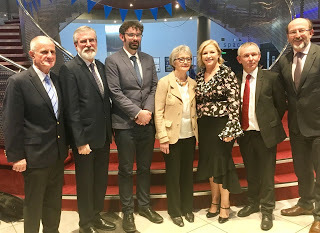 Martin McAleese, Mise, Maurice Fitzpatrick, Brid Rodgers, Liz O'Donnell, John Doylen DCU, and Brian MCraith, President DCU
Martin McAleese, Mise, Maurice Fitzpatrick, Brid Rodgers, Liz O'Donnell, John Doylen DCU, and Brian MCraith, President DCU
Published on October 13, 2018 08:50
Gerry Adams's Blog
- Gerry Adams's profile
- 29 followers
Gerry Adams isn't a Goodreads Author
(yet),
but they
do have a blog,
so here are some recent posts imported from
their feed.



